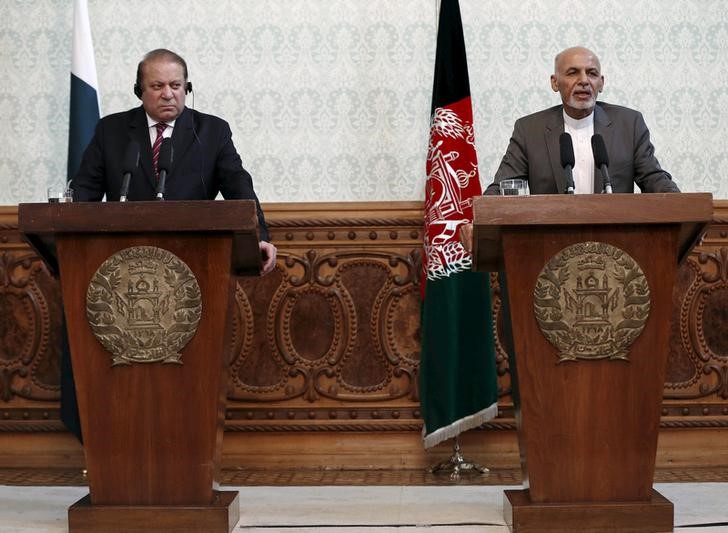By Kay Johnson and Mehreen Zahra-Malik
ISLAMABAD (Reuters) - The first official peace talks between the Afghan Taliban and the government in Kabul concluded with an agreement to meet again after the Muslim fasting month of Ramadan, officials said on Wednesday.
Pakistan hosted the meeting in a tentative step towards ending more than 13 years of war in neighboring Afghanistan, where the Taliban have been trying to re-establish their hard-line Islamist regime after it was toppled by U.S.-led military intervention in 2001.
The next round of talks is provisionally planned for Aug. 15 and 16 in Doha, capital of Qatar, according to sources close to the participants.
Tuesday's meeting was hailed as a "breakthrough" by Pakistani Prime Minister Nawaz Sharif.
But it was far from clear whether the budding peace process could end an escalating conflict that kills hundreds of Afghans every month.
Divisions within the Taliban over the peace process run deep. Top battlefield commander Abdul Qayum Zakir, a former Guantanamo Bay detainee, objected to sending the delegation for talks with Kabul, according to a lower-level Taliban commander in Kunar province in eastern Afghanistan.
Just ahead of the talks in Pakistan, the Taliban launched two suicide attacks in Kabul on Tuesday, killing one person and wounding three.
A U.S. drone strike also killed a former Taliban commander who pledged loyalty to Islamic State and had seized territory in the eastern province of Nangarhar.
"SENSE OF CELEBRATION"
Observers from the United States and China attended the talks, held overnight from Tuesday into Wednesday in Murree, a hill resort near Islamabad.
In recent months there have been informal preliminary contacts between Taliban representatives and Afghan figures, but this was the first official meeting.
According to a senior Pakistani official familiar with the talks, delegates met from around 10 p.m. (1300 ET) on Tuesday, after they had broken their fast, to 4 a.m. on Wednesday.
The atmosphere at the meeting was "positive" and "warm", he said, and it ended with the sides sharing "sehri", the pre-dawn meal Muslims eat before a new day of fasting begins, consisting of tea, omelettes, yoghurt, fruit, curry and paratha flatbreads.
"When they sat down for the sehri meal, it was as if they were celebrating Eid. There was a sense of celebration," the Pakistani official said, referring to the holiday marking the end of the fasting month of Ramadan.
"Before this, Pakistan has been accused of double dealing, but this time there can be no doubt about our sincerity," he added. Many Afghans have deep misgivings about Pakistan's involvement in the peace process.
Pakistan helped the Taliban come to power in Kabul in the 1990s and has been criticized for continuing to support jihadist groups to carry out its foreign policy agenda.
It has vowed to crack down on militancy, perhaps aware that regional powerhouse China wants it to do more to snuff out the danger of insurgents in its own western region of Xinjiang.
Afghan President Ashraf Ghani has reached out to Islamabad since taking office last year, and Pakistan has pledged to pressure Taliban leaders, many of whom are believed to be hiding in the country, to come to the negotiating table.
White House spokesman Josh Earnest said the United States welcomed the talks, calling them "an important step toward advancing prospects for a credible peace".
Chinese Foreign Ministry spokeswoman Hua Chunying said China backed the process and was in touch with all sides.
Sharif cautioned that the talks would be difficult and said Afghanistan's neighbors and the international community should ensure "nobody tries to derail this process".
DIVISION AMONG TALIBAN
The participants in Tuesday's meeting "were duly mandated by their respective leadership" according to the Pakistani statement, and the Pakistani official said the Taliban's political office in Qatar had given its blessing.
Taliban political leader Akhtar Mohammad Mansour also authorized the delegation to Islamabad for talks, despite objections from battlefield commander Zakir, according to the Taliban commander in Kunar.
"The problem is it (the meeting) further deepened differences between Mansour and Zakir," he said.
"Zakir ... threatened Mansour that he and his men would either set up another group or would join Islamic State if he did not stop the negotiations."
Because Zakir holds sway over several thousand fighters in eastern Afghanistan, it is uncertain whether any ceasefire, likely be the first demand by Kabul, could hold.
Silent throughout the process has been Mullah Mohammad Omar, the Taliban's reclusive supreme leader who has not been seen in public since the Taliban was toppled.

Some disgruntled Taliban commanders question whether Omar is alive, and several have switched loyalty to Islamic State, the Middle East-based group that has seized swathes of territory in Iraq and Syria.